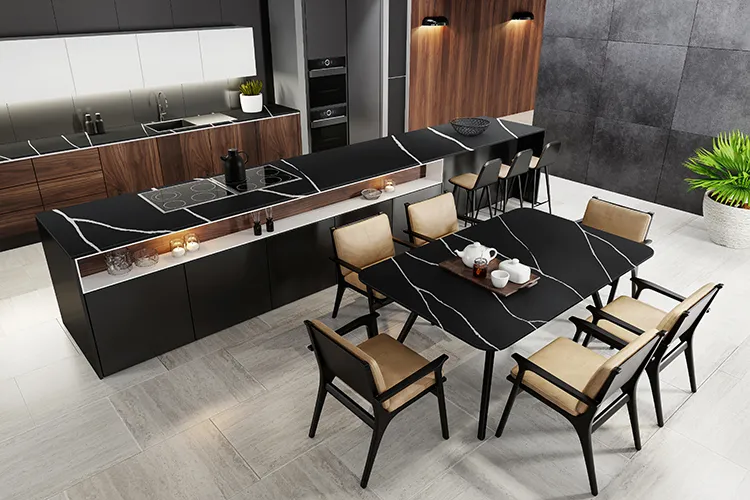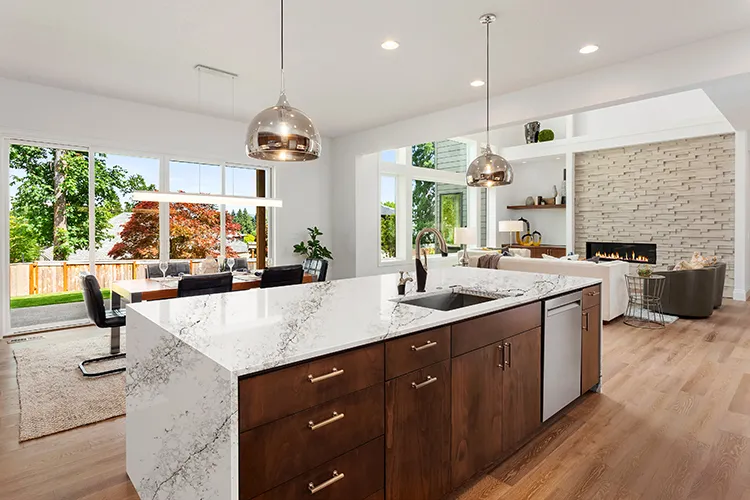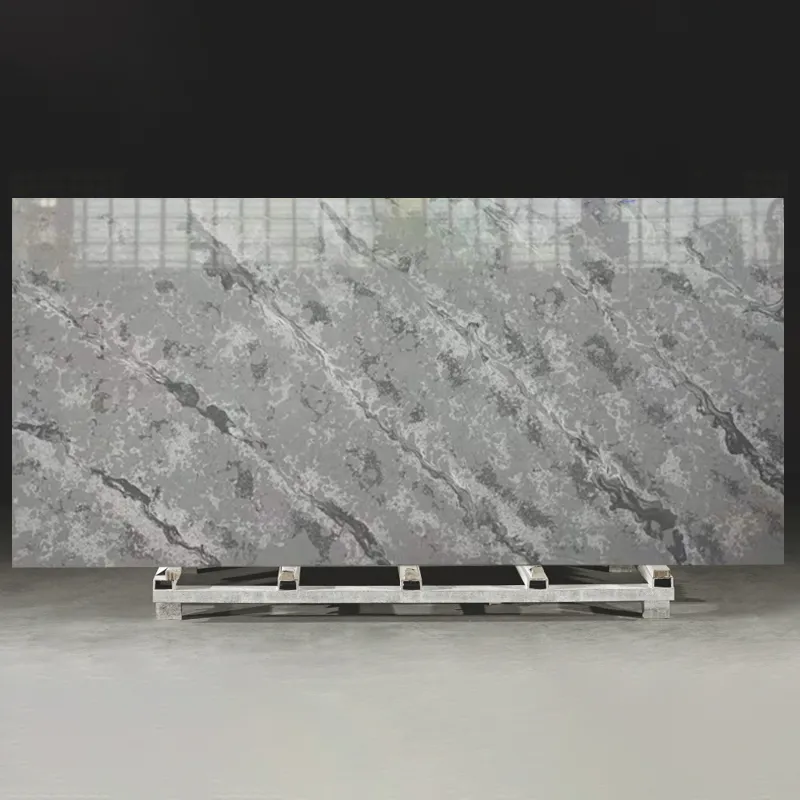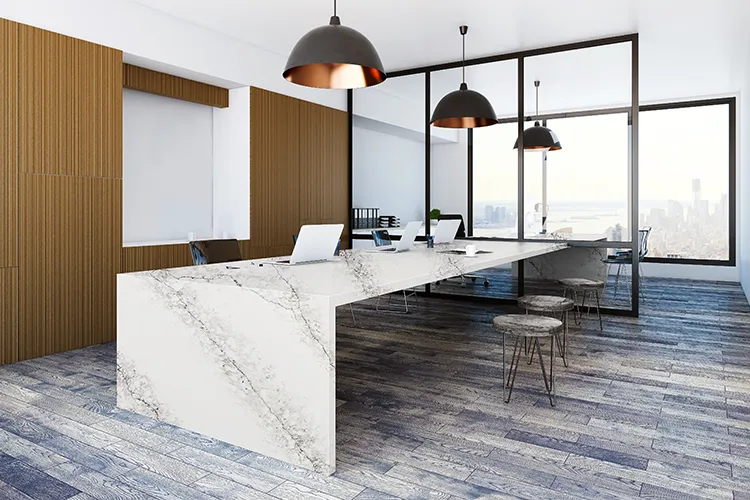In modern kitchen design, undermount sinks have become a stylish and practical choice. This design not only makes your kitchen look more neat and organized, but also brings great convenience to daily cleaning. However, choosing the right kitchen counter top to match the undermount sink is not an easy task. Different kitchen countertop materials not only have their own characteristics in appearance and style, but also directly affect the installation method and lifespan of the undermount sink.
In this news, we will explain to you in detail how to choose the most suitable kitchen counter top for undermount sinks, from materials, installation to aesthetic considerations, and take you to deeply understand the advantages and disadvantages of various kitchen countertop materials to help you make the most informed choice.

What is an undermount sink?
An undermount sink is a sink that is installed under the kitchen countertop. Unlike traditional above-mount sinks, the edge of an undermount sink is fixed under the kitchen countertop, so that the edge of the sink is completely hidden under the kitchen countertop, presenting a smooth and seamless appearance.
The biggest advantage of this design is that it is easy to clean. The lack of protruding edges means you can easily sweep crumbs and stains from the kitchen countertop directly into the sink, reducing the amount of food residue that accumulates on the edge of the sink. Undermount sinks are often seen as part of high-end kitchen design because they are not only practical but also enhance the overall aesthetics of the kitchen.
However, the installation of an undermount sink requires certain requirements for the kitchen countertop material, because the sink needs to be firmly installed under the kitchen countertop, which means that the kitchen counter top material must be strong and durable enough to withstand the weight of the sink and the wear and tear of daily use.
Which kitchen countertops are suitable for undermount sinks?
Not all kitchen countertop materials are suitable for undermount sinks. Choosing the wrong kitchen countertop material will not only affect the installation effect of the sink, but may also cause the kitchen countertop to be damaged, cracked, and other problems. Therefore, when choosing a kitchen countertop, be sure to consider the following materials that are suitable for undermount sinks:
● Stone kitchen countertops: Such as granite, marble, and quartz kitchen countertops, these materials are strong and durable and can easily support the weight of an undermount sink. They also have excellent water resistance, which effectively prevents moisture from penetrating the interior of the kitchen countertop.
● Concrete kitchen countertops: Concrete kitchen countertops are also an extremely sturdy choice. Not only are they durable, but they can be customized in color and texture to perfectly match undermount sinks.
● Solid surface materials: Materials such as artificial quartz and some high-density composites are also very suitable for undermount sinks. These materials are not only beautiful, but also have good water resistance and durability.
On the other hand, some softer and more fragile kitchen counter top materials, such as laminate or wood, are not suitable for undermount sinks. Although these materials are less expensive, they are easily affected by moisture during use, which may cause the kitchen counter top to crack and warp.

Understanding the installation of undermount sinks
Undermount sinks are more complicated and require higher technical requirements than traditional abovemount sinks. First, the kitchen countertop material must be precisely cut and polished to ensure that the sink can fit the kitchen countertop opening perfectly. Secondly, since undermount sinks have no edge support, the weight of the sink relies entirely on the kitchen countertop and the fixing bracket, so strong adhesives and brackets must be used to fix the sink during installation.
During the installation process, there are several key points that require special attention:
● Sealing: In order to prevent moisture from penetrating into the joint between the kitchen countertop and the sink, it must be fully sealed during installation. Commonly used sealing materials include silicone or epoxy resin, which can effectively prevent moisture penetration while maintaining a firm connection between the sink and the kitchen counter top.
● Support structure: Undermount sinks usually require additional support structures to bear the weight of the sink. Common support methods include using metal brackets or wooden frames to firmly fix the sink under the kitchen counter top.
● Kitchen countertop treatment: The installation of undermount sinks requires that the edges of the kitchen countertop must be flat and smooth, so before installation, the kitchen countertop must be sanded and polished to ensure that there are no burrs or unevenness on the edges.
Overall, the installation process of an undermount sink requires an experienced professional to ensure that the sink is securely installed, beautiful, and durable.

Why is a stone kitchen countertop your best choice?
Stone kitchen countertops have always been a classic choice in kitchen design, and they are the perfect match for undermount sinks. Whether it is granite, marble, or quartz, these natural or artificial stones have the following significant advantages, making them the best choice for undermount sinks.
First, stone kitchen counter tops are very strong and durable, and can easily withstand the weight of an undermount sink and the various wear and tear of daily use. In contrast, some other materials, such as laminate or wood, are easily damaged or deformed by moisture.
Second, stone kitchen counter tops have excellent water resistance. Due to the natural properties of stone, they can effectively prevent water from penetrating and prevent the kitchen counter top from getting damp or moldy. This is especially important for undermount sinks, because the joints between the sink and the kitchen countertop are most likely to accumulate moisture. Choosing a kitchen countertop material with excellent waterproof performance can greatly extend the service life of the kitchen countertop.
Finally, the appearance of a stone kitchen countertop is extremely beautiful. Whether it is the elegant texture of marble, the natural mottled of granite, or the diverse colors of quartz, a stone kitchen countertop can add a touch of nobility and luxury to your kitchen. For those who pursue high-end design and elegant life, a stone kitchen countertop is undoubtedly the best choice.
Marble: The Eternal Stone of Undermount Sinks
Marble has always been an evergreen in high-end kitchen design. Its unique texture and soft tones make marble kitchen countertops one of the ideal choices for undermount sinks. The texture of marble kitchen countertops is naturally unique, and each piece of marble kitchen counter top is a unique work of art. This uniqueness gives marble kitchen counter tops a distinctive elegance that can easily enhance the grade of the entire kitchen. Secondly, although the texture of marble is relatively soft, its beauty and plasticity are unparalleled. Marble kitchen counter tops can be easily processed into various complex shapes and edge types, perfectly adapting to the installation needs of undermount sinks.
However, marble kitchen counter tops also have their shortcomings. Since marble is relatively soft, special attention needs to be paid during use to avoid scratches and corrosion from acidic substances. In addition, marble has large pores and is easy to absorb liquids, so it needs to be sealed regularly to maintain its waterproof performance. Despite this, the elegant appearance and unique texture of marble still make it a classic partner for undermount sinks. If you are looking for extreme beauty and delicate design, marble is definitely an option worth considering.
Granite: One of the best choices for undermount sinks
If you are looking for a kitchen countertop material that is both beautiful and durable, granite is definitely an option worth considering. As the tough guy among natural stones, granite is an ideal match for undermount sinks with its excellent hardness and rich color options.
Granite kitchen counter tops are extremely strong and can easily withstand the weight of undermount sinks and various impacts and wear in daily kitchen activities. In contrast, some other materials may wear or deform due to frequent use, but granite does not have to worry about these problems. Secondly, granite kitchen countertops have excellent anti-fouling and antibacterial properties. Due to the high density of granite, its surface is not easy to absorb liquids and bacteria, which makes granite kitchen counter tops excellent in keeping clean and hygienic. This feature is particularly important in the installation area of undermount sinks, because this is where moisture and dirt are most likely to accumulate.
In addition, granite kitchen counter tops are extremely rich in colors and textures, which can meet the needs of kitchen design in various styles. Whether it’s deep black, soft beige, or mottled gray, granite can add a touch of natural and textured beauty to your kitchen.
Overall, granite kitchen counter tops are one of the best partners for undermount sinks due to their excellent durability, easy maintenance, and variety of aesthetic options. If you want to combine beauty and practicality in your kitchen, granite is undoubtedly a reliable choice.

Quartz kitchen counter tops for undermount sinks: What makes quartz the best choice?
Quartz kitchen countertops have quickly become popular in kitchen design in recent years, and their popularity is mainly due to their excellent performance and variety of aesthetic options. As a man-made stone, quartz kitchen counter tops are made of natural quartz particles mixed with resin, which has the dual advantages of natural stone and modern technology. Quartz kitchen counter tops are extremely durable. Not only does it have the solidity of stone, but it is also more scratch-resistant and stain-resistant due to the resin component inside. This high durability makes quartz kitchen counter tops easy to handle undermount sink installation and daily use, making them a reliable choice in the kitchen.
Secondly, quartz kitchen counter tops have excellent waterproof properties. Since quartz kitchen countertops are pressed under high pressure during the manufacturing process, the internal structure is tight and there are almost no pores. This feature makes quartz kitchen counter tops excellent in waterproof, stain-resistant and antibacterial performance, especially suitable for the installation of under-mount sinks. In addition, quartz kitchen countertops have a wide range of color and texture options. Because it is an artificial stone, quartz kitchen countertops can be customized in color and pattern according to customer needs. Whether it is to imitate the texture of natural stone or create a unique modern design, quartz kitchen countertops can easily achieve it.
Overall, quartz kitchen countertops combine the beauty of natural stone with the superior performance of modern materials, making it an ideal choice for under-mount sinks. If you want to combine beauty, practicality and personalization in your kitchen design, quartz kitchen counter tops are undoubtedly an option that cannot be missed.
Concrete kitchen counter tops: a modern choice for under-mount sinks
For kitchen designers who pursue unique and modern styles, concrete kitchen counter tops are an exciting choice. Although concrete kitchen counter tops were often used in industrial or outdoor designs in the past, in recent years they have become a popular companion to undermount sinks due to their extreme customizability and modern look.
The biggest advantage of concrete kitchen countertops is their extreme customizability. Whether it is color, texture, shape or size, concrete kitchen countertops can be tailored to the specific needs of customers. This makes concrete kitchen countertops a perfect match for a variety of different styles of kitchen designs, especially those that pursue personalized and unique designs. Secondly, concrete kitchen countertops are extremely durable. Properly treated concrete kitchen countertops have the strength and durability to withstand the weight of undermount sinks as well as the various impacts and wear and tear of daily kitchen use. However, it is worth noting that concrete kitchen countertops need to be sealed regularly after the initial installation to maintain their water resistance and stain resistance.
Finally, concrete kitchen countertops have a unique industrial aesthetic. With its rough, natural appearance, this material gives the kitchen a unique sense of modernity and industrial style. For those who want to incorporate more modern elements into their kitchen design, concrete kitchen countertops are undoubtedly an exciting choice.
However, concrete kitchen countertops also have their disadvantages. First, concrete kitchen countertops are heavy, and special attention needs to be paid to the supporting structure of the kitchen countertop during installation. Second, due to the characteristics of concrete materials, its surface is prone to tiny cracks, which require regular maintenance and repair.
Nevertheless, concrete kitchen countertops have become a modern choice for undermount sinks due to their unique aesthetics and high customizability. If you are looking to try something different in your kitchen design, concrete kitchen countertops are undoubtedly an option worth considering.

